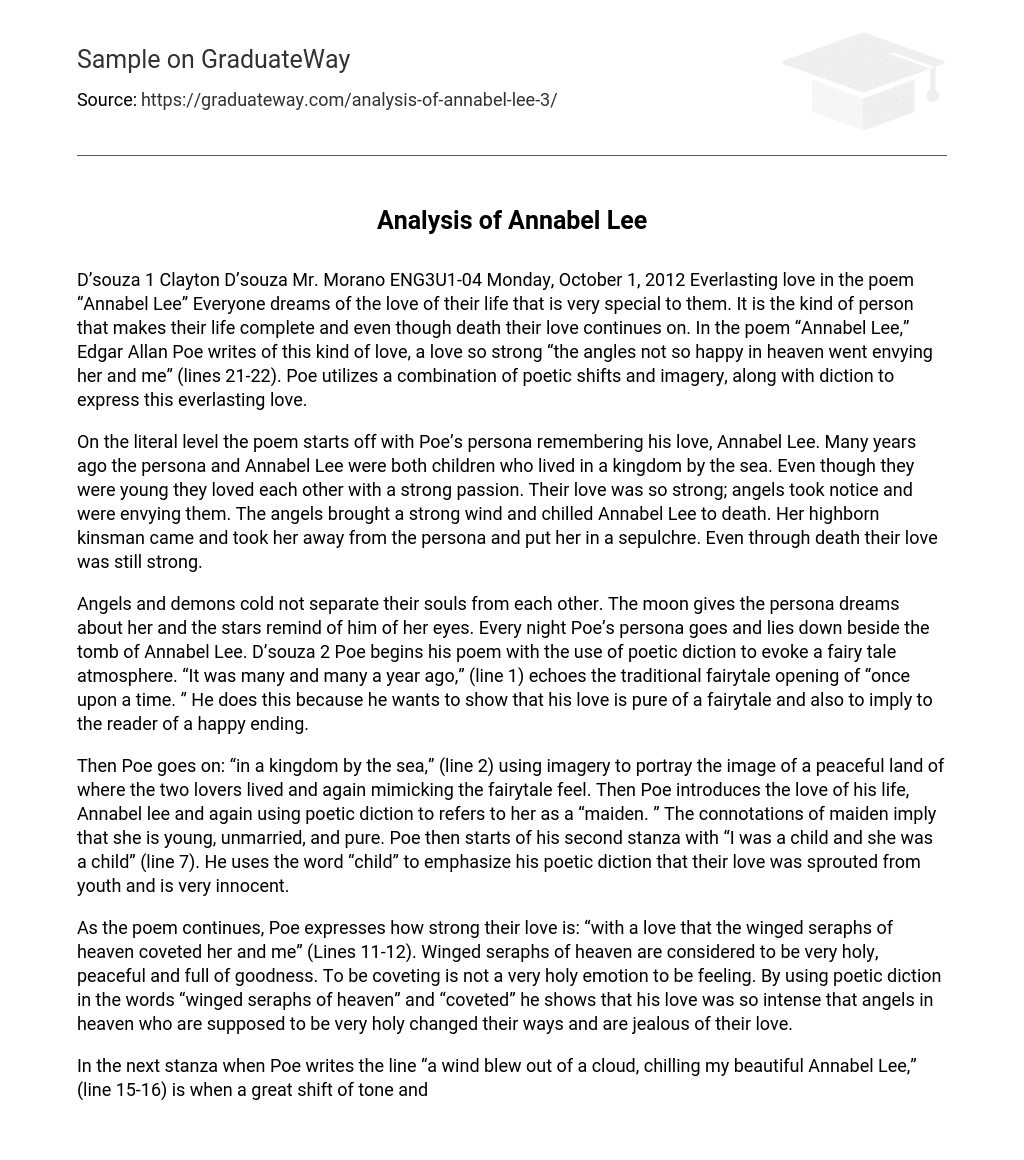In “Annabel Lee,” Edgar Allan Poe discusses the unique love that everyone yearns for, a love that remains even beyond death. This type of love is the one that fills their life with completeness and is so powerful that even the angels in heaven envy it. Poe effectively conveys this eternal love through a combination of poetic shifts, imagery, and carefully chosen words.
The poem begins with the persona of Poe recalling his love, Annabel Lee. The persona and Annabel Lee were once children living in a kingdom by the sea. Despite their young age, they had a deep and passionate love for each other. Their love was so intense that even angels became envious of them. The angels caused a powerful wind that led to the chilling death of Annabel Lee. Her noble relatives then took her away from the persona and laid her in a sepulchre. However, even in death, their love remained strong.
Angels and demons were unable to separate their souls. The moon fills the persona’s dreams with thoughts of the person, while the stars remind him of her eyes. Each night, Poe’s persona lies beside Annabel Lee’s tomb. To create a fairy tale atmosphere, Poe employs poetic diction at the beginning of his poem. The line “It was many and many a year ago” mimics the traditional fairy tale opening of “once upon a time.” By doing this, he conveys that his love is as pure as that of a fairy tale and hints at a happy ending for the reader.
In this passage, Poe begins by describing a peaceful kingdom by the sea, using imagery to create a fairytale-like atmosphere. He introduces Annabel Lee, whom he refers to as a maiden, suggesting her youth and purity. In the second stanza, Poe emphasizes the innocence and youthfulness of their love by stating that he was a child and she was a child.
In the continuation of the poem, Poe depicts the immense strength of their love with the line, “with a love that the winged seraphs of heaven coveted her and me” (Lines 11-12). The winged seraphs of heaven are revered for their sacredness, tranquility, and virtue. The act of coveting, however, is not a virtuous emotion. Through the use of poetic language in the phrases “winged seraphs of heaven” and “coveted,” Poe conveys the intensity of their love by suggesting that even heavenly angels, who are expected to be morally pure, have been influenced by their passion and now feel jealousy towards their love.
Poe employs a shift of tone and imagery in the next stanza, specifically when he writes “a wind blew out of a cloud, chilling my beautiful Annabel Lee” (lines 15-16). This shift serves to convey his profound grief over the death of Annabel Lee and to emphasize the depth of his love for her. He continues by stating, “so that her high born kinsman came and bore her away from me, to shut her up in a sepulcher” (lines 17-19). This quote illustrates the separation between the two lovers, portraying a negative connotation with the phrase “shut her up” as opposed to a more positive phrase like “lay her down.”
In order to express his negativity towards the highborn kinsman who took Annabel Lee away, Poe purposely incorporates dark and scary imagery of wind, clouds, and night. This is evident in the line “that the wind came out of the cloud by night” (line 25) in the fourth stanza. However, a shift occurs in the last stanza where Poe seems to accept Annabel Lee’s death and believes it will not affect their love. He conveys this acceptance through the lines “for the moon never beams without bringing me dreams of the beautiful Annabel lee and the starts never rise but I feel the bright eyes of the beautiful Annabel lee” (Lines 34-37).
Poe’s use of diction, shifts, and imagery are what make his poem a poetic masterpiece and effectively convey the theme of everlasting love. He goes from emphasizing dark imagery to portraying light, using moonbeams to represent dreams of his beloved and stars to symbolize her radiant eyes. Through these literary devices, Poe captures all the heartfelt emotions of his persona and provides readers with an understanding of the profound love depicted in the poem. Without these elements, the poem would fail to effectively convey its theme.





